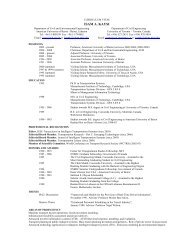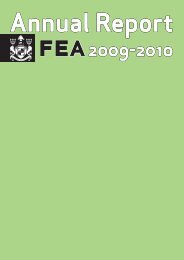Annual Report 2007-08 - FEA - American University of Beirut
Annual Report 2007-08 - FEA - American University of Beirut
Annual Report 2007-08 - FEA - American University of Beirut
You also want an ePaper? Increase the reach of your titles
YUMPU automatically turns print PDFs into web optimized ePapers that Google loves.
48<br />
Student Exchange<br />
AUB and UJM agree that student exchange will be guided<br />
by principles listed below. A home institution refers to the<br />
institution where a student is a full-time student, and from<br />
where he/she is expected to graduate. A host institution refers<br />
to an institution that receives a student for a brief period <strong>of</strong><br />
time to undertake a pre-determined programme <strong>of</strong> study or<br />
research.<br />
Exchange students will be selected by mutual agreement<br />
between the home institution and the host institution.<br />
An exchange student will continue to be treated as full-time<br />
student at his/her home institution.<br />
An exchange student will be considered as full-time<br />
“exchange” student at the host institution.<br />
His/her program <strong>of</strong> study at the host institution will be<br />
determined by mutual consultation between his/her<br />
academic advisor at the home institution and his/her<br />
“interim” academic advisor identified by the host institution.<br />
The host institution will evaluate an exchange student’s<br />
performance in each course or module, award a letter grade<br />
or marks, and issue a letter to that effect.<br />
The home institution may award to the exchange student<br />
credits earned at a host institution, but only after the home<br />
institution has established correspondence between courses<br />
taken at the host institution vis-a-vis those <strong>of</strong>fered at the<br />
home institution.<br />
If an exchange student has undertaken research, then<br />
the host institution will evaluate the exchange student’s<br />
performance in the research, and issue a letter to that effect,<br />
together with a technical “report” <strong>of</strong> the research carried<br />
out,<br />
If an exchange student has undertaken research, then<br />
the home institution will take note <strong>of</strong> the performance<br />
evaluation and the technical report, and take steps in<br />
accordance with its own procedures.<br />
As a host institution, AUB and UJM will make every effort to<br />
arrange for subsidized housing for exchange students.<br />
AUB and UJM will examine ways to identify financial<br />
resources to fund, accommodation, food, and international<br />
travel by students.<br />
The exchange students will pay tuition and other fees at<br />
their home institution.<br />
Joint Conferences, Workshops and Short-term Courses<br />
AUB and UJM agree to help identify and invite faculty<br />
members from the other institution to participate in<br />
conferences, workshops and short-term courses. The terms<br />
and conditions for such participation will be worked out by<br />
mutual agreement between the invited faculty member(s) and<br />
the institution extending such an invitation.<br />
When a faculty member visits the other institution on<br />
invitation or as part <strong>of</strong> such joint activity, then such a visit will<br />
be classified as such, and handled as per rules <strong>of</strong> individual<br />
institution.<br />
Intellectual Property<br />
AUB and UJM agree to respect each other’s rights to<br />
intellectual property. Further, the intellectual property rights<br />
that arise as a result <strong>of</strong> any collaborative research or activity<br />
under this MoU will be worked out on a case-by-case basis,<br />
and will be consistent with the <strong>of</strong>ficially laid down IPR policies<br />
<strong>of</strong> the two institutions.<br />
Co‑ordination<br />
Each institution shall appoint one member <strong>of</strong> its teaching/<br />
research faculty to coordinate the program on its behalf.<br />
Tenure and Termination:<br />
This MoU will take effect from the date it is signed by<br />
representatives <strong>of</strong> the two institutions. It will remain valid<br />
for five years, and may be continued thereafter after suitable<br />
review and agreement.<br />
Either institution may terminate the MoU by giving written<br />
notice to the other institution six months in advance. Once<br />
terminated, neither AUB nor UJM will be responsible for any<br />
losses, financial or otherwise, which the other institutions may<br />
suffer. However, AUB and UJM will ensure that all activities in<br />
progress are allowed to be completed successfully.<br />
Third Year Summer<br />
Internship at<br />
the <strong>University</strong> <strong>of</strong><br />
Waterloo<br />
Hrag Margossian<br />
As part <strong>of</strong> a graduation requirement by the ECE department,<br />
I worked at the <strong>University</strong> <strong>of</strong> Waterloo for a period <strong>of</strong> two<br />
months, in the power research group headed by Pr<strong>of</strong>essor<br />
Magdy Salama who was my internship supervisor. I was<br />
assigned to two tasks there; the first was <strong>of</strong> a literature review<br />
nature and the second was more technical in the university HV<br />
lab.<br />
The first two weeks I worked with Ahmed Bayoumi, a PhD<br />
candidate at the <strong>University</strong> <strong>of</strong> Waterloo, who was working<br />
on enhancing the condition monitoring techniques for high<br />
voltage equipment like circuit breakers for his PhD thesis.<br />
I prepared a pr<strong>of</strong>essional report for him on the different<br />
techniques available today and the advantages/disadvantages<br />
<strong>of</strong> each one and possible windows for improvement that<br />
he would use as a reference. The report was also added to<br />
Pr<strong>of</strong>essor Salama’s archive for later use.<br />
For my second assignment<br />
I worked with Dr. Samy<br />
Ghania, the supervisor <strong>of</strong><br />
the HV lab as well as two<br />
other students, one doing<br />
his masters in mechanical<br />
engineering at UW and<br />
the other an exchange<br />
student from Germany,<br />
working for a diploma in<br />
sensors engineering. The<br />
purpose <strong>of</strong> the project was<br />
to increase the efficiency<br />
<strong>of</strong> regenerative breaking<br />
in motors used in hybrid<br />
electric cars. The motor<br />
and the different parts<br />
making up the “car” are<br />
shown in the figure, the<br />
balancing <strong>of</strong> the load as<br />
well as the other parts<br />
4.<br />
research<br />
making up the mechanical aspects <strong>of</strong> the project were carried<br />
out by the mechanical engineering student. The other student<br />
added sensors to the different parts <strong>of</strong> the motor (to measure<br />
torque, voltage variation, speed, pressure, vibrations, ect).<br />
As for the drive <strong>of</strong> the motor, I worked with Dr. Samy on the<br />
boards that were available but defective. The figures show the<br />
two boards that we worked on:<br />
49







